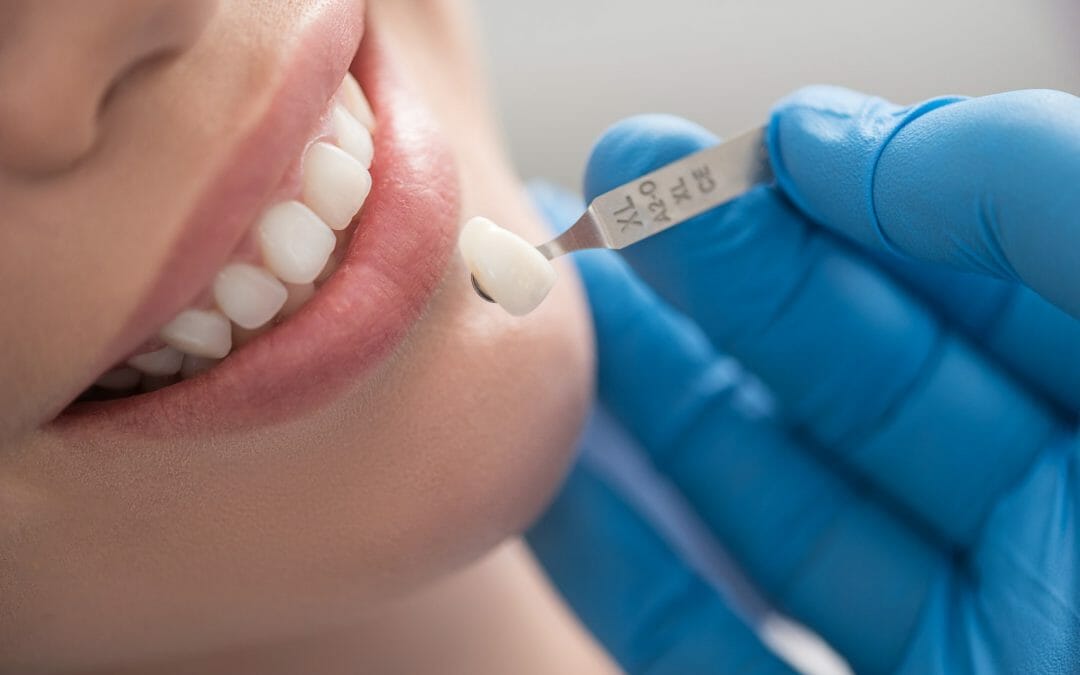Dental crowns are a popular solution for restoring damaged or weakened teeth, and their maintenance is essential to ensure their longevity. Maintaining your dental crown can help you avoid complications like tooth decay, gum disease, and damage to the crown itself. In this blog, we will discuss what a dental crown is and why maintaining them is crucial. We will also provide you with tips on how to care for your dental crown, including brushing and flossing techniques, eating habits to avoid, and regular dental visits. Additionally, we will cover the possible complications of improper maintenance and how long these crowns last. Lastly, we’ll delve into the cost-benefit analysis of maintaining dental crowns so that you can make an informed decision about your oral health.
What are Dental Crowns?
A dental crown is a tooth-shaped cap that is placed over a damaged or decayed tooth to restore its shape, strength, and function. Made from materials like ceramic, metal, or a combination of both, crowns are versatile in their use, tackling issues like broken teeth, large fillings, and root canals. Proper maintenance of dental crowns is crucial for their longevity and for preventing future dental problems. Regular brushing and flossing combined with avoiding hard foods and scheduling regular dental check-ups are effective ways to maintain your dental crowns.
Importance of Dental Crown Maintenance
Proper maintenance of your dental crown is essential in ensuring its longevity and oral health. Neglecting to care for your crown can result in decay around the margins, sensitivity, or even a loose or damaged crown. Regular dental check-ups can help detect any issues early on, and practicing good oral hygiene habits at home can prevent further complications. By taking the necessary steps to maintain your dental crown, you can save yourself from costly replacements and enjoy a healthy, beautiful smile for years to come.
Why is maintenance necessary?
Maintaining the longevity of dental crowns requires regular maintenance. Without proper care, crowns can become loose, fall out, and cause extensive dental work. Regular maintenance includes brushing and flossing techniques and avoiding hard or sticky foods. It may also require regular dental check-ups to monitor the condition of the crown. By taking these preventative measures, you can prevent issues such as decay or damage to the crown, preserve your overall oral health, and save yourself from costly replacements in the future.
Benefits of maintaining dental crowns
Maintaining your dental crown has several benefits that can help you maintain good oral health. Regular maintenance of your crown can prevent decay and gum disease, saving you from costly treatment in the future. Taking care of your crown can also prolong its lifespan, reducing the need for expensive replacements. It is crucial to follow proper cleaning techniques such as brushing and flossing regularly to keep your dental crown in good condition. Avoid chewing hard foods or sticky candy as they can cause damage to the crown. Regular dental check-ups are essential to ensure that your crown is in good condition and any potential issues are detected early on.
Dental Crown Care Tips
Proper care and maintenance of dental crowns are crucial to ensuring their longevity and effectiveness. To keep your crown in good condition, it’s essential to practice good oral hygiene by brushing and flossing regularly. Avoid biting down on hard objects or chewing ice as this can cause damage to the crown. Additionally, scheduling regular dental check-ups with your dentist can help identify any issues early on and prevent further complications. Using mouthwash as recommended by your dentist can also aid in maintaining good oral health and prolong the life of your crown. Remember that taking care of your dental crown is an investment in your overall oral health and well-being.
Brushing and Flossing Techniques
Proper brushing and flossing techniques are crucial to maintaining the health of your dental crowns. To ensure longevity, use a soft-bristled toothbrush and fluoride toothpaste to brush your teeth twice a day. Floss daily, paying extra attention to the area around the crown. Abrasive or whitening toothpaste can damage the crown’s surface, so it’s best to avoid them. Regular dental checkups and cleanings are also important for maintaining good oral hygiene with dental crowns. By following these simple steps, you can keep your crown in excellent condition for years to come.
Eating Habits to Avoid
Certain eating habits can damage or loosen dental crowns, making it essential to be mindful of what you eat. Chewing on hard candy or ice can cause significant damage to your crown and may even lead to the need for a replacement. Sticky or chewy foods can pull on the crown, causing it to become loose over time. To avoid this, it’s important to exercise caution when eating hard foods and stick to a softer diet when possible. Additionally, practicing good oral hygiene habits like brushing and flossing regularly can help prevent decay or damage to the tooth underneath the crown.
Regular Dental Visits
Maintaining regular dental visits is crucial to the longevity and health of your dental crowns. During these appointments, your dentist can check for any signs of wear or damage to the crown and provide necessary repairs or replacements. Professional cleaning can also help remove any buildup of plaque or tartar that may affect the crown’s fit and function. It is recommended to schedule dental appointments every six months to ensure proper maintenance of your crowns. In between visits, it’s important to maintain good oral hygiene practices such as daily brushing and flossing.
Possible Complications of Improper Maintenance
Improper maintenance of dental crowns can lead to various complications, such as tooth decay, gum disease, discomfort while eating or speaking, and damage to neighboring teeth. Neglecting crown care can cause the crown to become loose or damaged, leading to costly repairs or replacements in the future. Discoloration or sensitivity in teeth may also occur due to improper maintenance. It is crucial to maintain good oral hygiene habits and schedule regular dental appointments every six months for the longevity and health of your dental crowns.
Tooth Decay or Gum Disease
Improper maintenance of dental crowns can lead to tooth decay and gum disease, which can cause discomfort and even jeopardize the health of your natural teeth. Although dental crowns are designed to protect the underlying tooth from damage and decay, they can still accumulate plaque and bacteria over time if not properly cleaned. This buildup can lead to inflammation around the crown, causing gum disease, or create gaps where decay-causing bacteria can thrive. Regular visits to your dentist for checkups and cleanings and thorough brushing and flossing at home are essential for maintaining good oral hygiene and preventing potential complications.
Loosened or Damaged Crowns
Loosened or damaged dental crowns can cause discomfort and even lead to tooth decay. It is essential to take proper care of your dental crowns through regular brushing and flossing. Regular dental checkups can help identify any issues with your dental crowns before they become more serious. If you notice any issues with your dental crowns, it’s important to contact your dentist immediately to avoid further complications. Remember that proper maintenance of dental crowns is crucial for their longevity and your overall oral health.
Discoloration or Sensitivity in Teeth
One of the potential consequences of improper dental crown maintenance is discoloration or sensitivity in teeth. Plaque buildup and bacterial growth around the crown can cause this issue, which can be uncomfortable and unattractive. Regular brushing, flossing, and dental checkups are essential for maintaining the health of your crown and preventing these complications. Additionally, using a mouthwash designed for crowns can help prevent discoloration and sensitivity while maintaining oral hygiene. If you notice any changes in the appearance or discomfort with your dental crowns, it’s vital to consult your dentist immediately to avoid further complications.
How Long Do Dental Crowns Last?
Dental crowns can last up to 15 years with proper maintenance. Regular dental check-ups and cleanings play a crucial role in prolonging their lifespan. However, it’s important to avoid hard foods that could damage the crown and practice good oral hygiene, including brushing and flossing regularly, to prevent decay around the crown. If you experience any discomfort or notice damage to your crown, visit your dentist immediately for repair or replacement. Proper care ensures that your dental crown lasts several years without any issues.
The Cost of Dental Crown Maintenance
Maintaining your dental crowns is crucial not only for the health of your teeth but also for your budget. Neglecting proper maintenance can lead to costly repair or replacement procedures in the future. By scheduling regular check-ups and practicing good oral hygiene, such as brushing and flossing regularly, you can extend the life of your dental crowns and avoid significant expenses down the line. Avoiding hard foods and habits such as teeth grinding can also help prevent damage to your dental crowns, making regular maintenance a wise investment in both your oral health and financial well-being.
Conclusion
Maintaining your dental crown is as important as getting it in the first place. Proper maintenance of dental crowns can help you save money and prevent future complications. With regular brushing, flossing, and dental visits, you can keep your dental crowns healthy for years to come. Failure to maintain your dental crowns can lead to tooth decay or gum disease, loosened or damaged crowns, and discoloration or sensitivity in your teeth. Don’t neglect the investment you made in your smile – take care of it! To learn more about the cost and benefits of maintaining your dental crowns, contact us today at Dentistry of West Bend.


Recent Comments